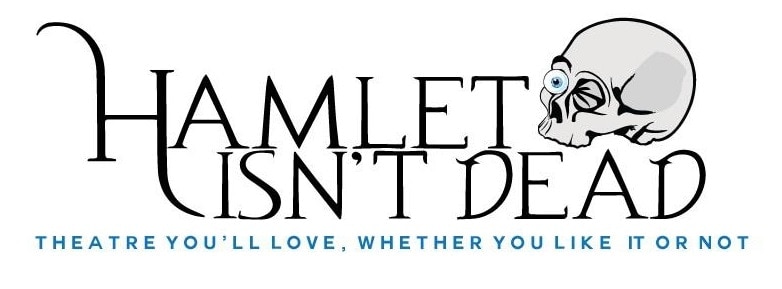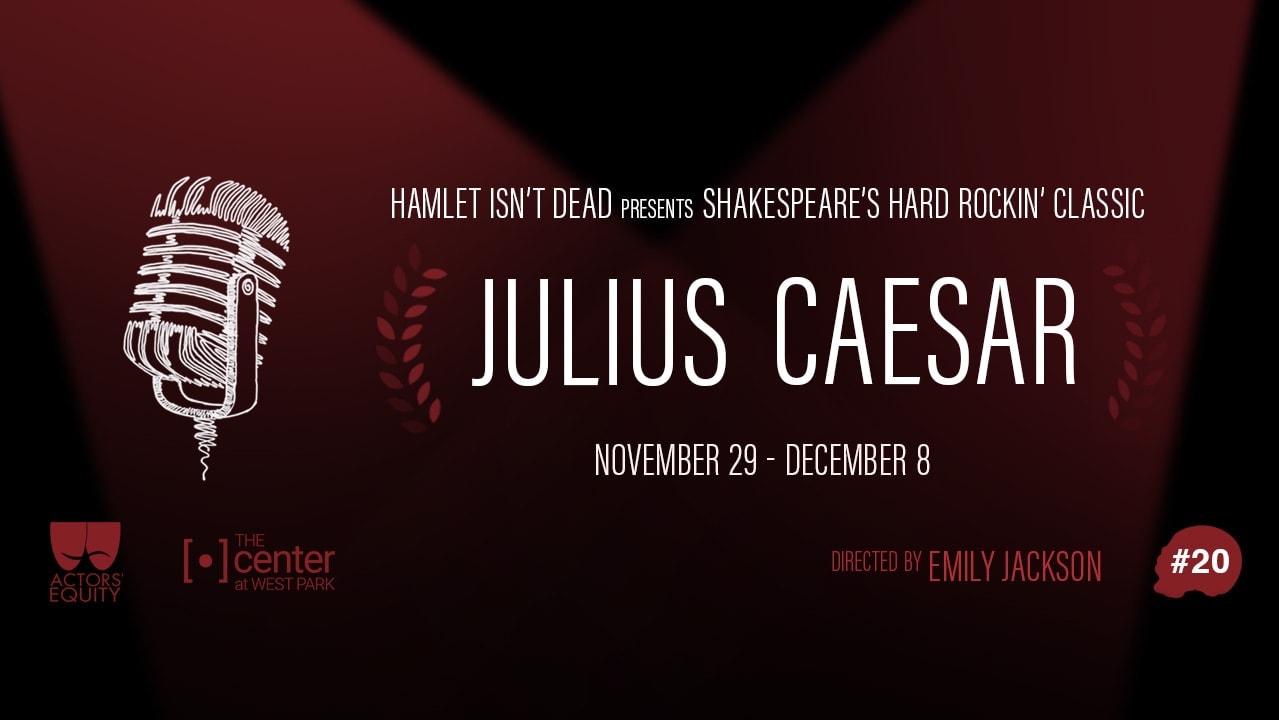Founded in 2013, by Executive Director James Rightmyer, Jr. and Artistic Director David Andrew Laws, Hamlet Isn’t Dead specializes in keeping Shakespeare alive for 21st-century audiences, through its signature brand of immediate theater infused with live music. Committed to producing The Bard’s entire canon in chronological order, the company’s latest offering, Julius Caesar, directed by Emily Jackson and designed by Tyler M. Perry, begins performances this week at The Center at West Park. Set in ancient Rome and filled with infamous figures, political intrigue, friendship and betrayal, the history piece is a testament to Shakespeare’s universality and his relevance in our current times, as is HID’s production, performed by an ensemble of twelve and featuring cross-gender casting.
James and David agreed to answer some questions about their artistic vision and what audiences can expect in their unique presentation of a Shakespearean classic.
What was your impetus in founding Hamlet Isn’t Dead?
James: David asked me to.
David: There are a lot of fun stories around this, but the main point is that being an actor in New York City can lead to a lot of waiting for someone else to let you do the thing you love. We founded Hamlet Isn’t Dead to take some of that power back. Now we can create our own art, tell our own stories, and foster our own community in a way that, we hope, maximizes fun for our artists and audiences, as well as ourselves.
What is the company’s main mission?
James: We’re producing Shakespeare’s canon in chronological order (in which it was written). It’s a total blast – we get to see Shakespeare’s growth as a writer, and also get to do the plays that are, well, “bad.” Some of them aren’t crap at all!
David: Another big part of what we do is proving that none of Shakespeare’s works needs “reinventing.” We approach them as if they were new.
Who do you hope to appeal to with your updated versions of Shakespeare? Who is your audience?
David: Our audience is everyone, and I think our favorite audience members are first-timers.
James: First timers, and also ESPECIALLY people who think they hate Shakespeare. It’s our goal to evangelize Shakespeare to all of the non-believers.
Your next production is Julius Caesar, opening on November 29. Have you updated the language, or are you using the original Shakespearean text?
David: It’s all the original language with some adjusted pronouns and the occasional ad lib. We try to make sure as much as possible that we’re telling the story Shakespeare intended, which sometimes requires a slight adaptation.
James: That’s right – it’s sort of a two part thing: one, we cut some extraneous stuff (historical context that has no meaning to a modern audience, or Elizabethan topical jokes); and then we are very precise about the rest of the text. When it’s done well, it doesn’t need an update because it’s very clear.

Your productions are set to a post-modern score. What does rock music bring to the story?
James: We like to add contemporary music in the spirit of Shakespeare himself – it’s a pet peeve of mine to use “authentic Shakespearean music” – which was actually popular music of his day. So it’s completely ineffective now. Rock music for Caesar feels like it captures the passion of the piece.
David: If Shakespeare included music from 400 years before his time, his audiences would have been incredibly confused – and likely irritated as well. It goes back to trying to mine Shakespeare’s intention.
Will the music for Julius Caesar be original, or cover versions of familiar hits?
James: All of the internal show music is original – by our composer and musical director Jordan Brooks – but there will be pre-show and intermission music that are covers.
David: There’s a lot of really nice original underscoring that highlights some of the more visceral moments of this piece, which, let’s face it, has a lot of words in it.
What is the purpose of cross-gender casting in a history play about real people and events?
James: Cross-gendered casting just makes sense in today’s age – it fixes all manner of sins of the classical text. Whether it’s toxic masculinity or a complete disregard for women, some of those values of the Elizabethan era just don’t work anymore. So updating in that way is hugely effective.
David: Unless the play is about gender (and even then), the gender of the actor playing the character is largely irrelevant. We strive to cast the most talented group of people we can find. Does that mean sometimes men play women and women play men? Sure. Does that change some of the interpretations of some parts of some stories? Sure. Would Shakespeare have done the same thing today? You better believe it.

What makes Julius Caesar relevant today, for a current audience?
David: Caesar’s a show about “doing what’s right,” and for a modern American audience, it’s a lot more ambiguous and possibly more pessimistic than it would have been for Shakespeare’s crowd. This is a play about words and their power, power and its influence, and the consequences of our actions, which are things with which we all have experience.
James: There’s obviously also the political undertones, but we think those are sort of mined out for the time being, so we’ve tried to limit that.
At what age were you first exposed to Shakespeare, and what was your reaction?
David: I was eleven and was cast as Bardolph in Henry V. I found it a somewhat embarrassing experience at first, mainly because of the makeup, but our Henry was inspiring. I found myself in rehearsal learning other people’s monologues because I loved the language so much.
James: Middle school. “Yeah, swords and kissing girls!” Enough said.
What’s your favorite work in the canon and why?
James: I can’t give a favorite, but top three (in no order): Twelfth Night, Midsummer, Hamlet. I guess I’m a traditionalist at heart.
David: My current favorite is Titus Andronicus, maybe simply because that’s such a divisive pick. It’s this intense, hyper-violent, heartbreaking play that’s also got a surprising amount of comedy in it. People who don’t like it just haven’t seen a good production of it (which is how I feel about most of Shakespeare’s canon).
Many thanks to both of you for giving our readers some insights into your goals and artistic choices for your upcoming production of Julius Caesar. I look forward to seeing the show!
Julius Caesar plays November 29-December 8, 2018, at Hamlet Isn’t Dead, performing at The Center at West Park, Balcony Theater – 165 West 86th Street, NYC. For tickets, go online.






